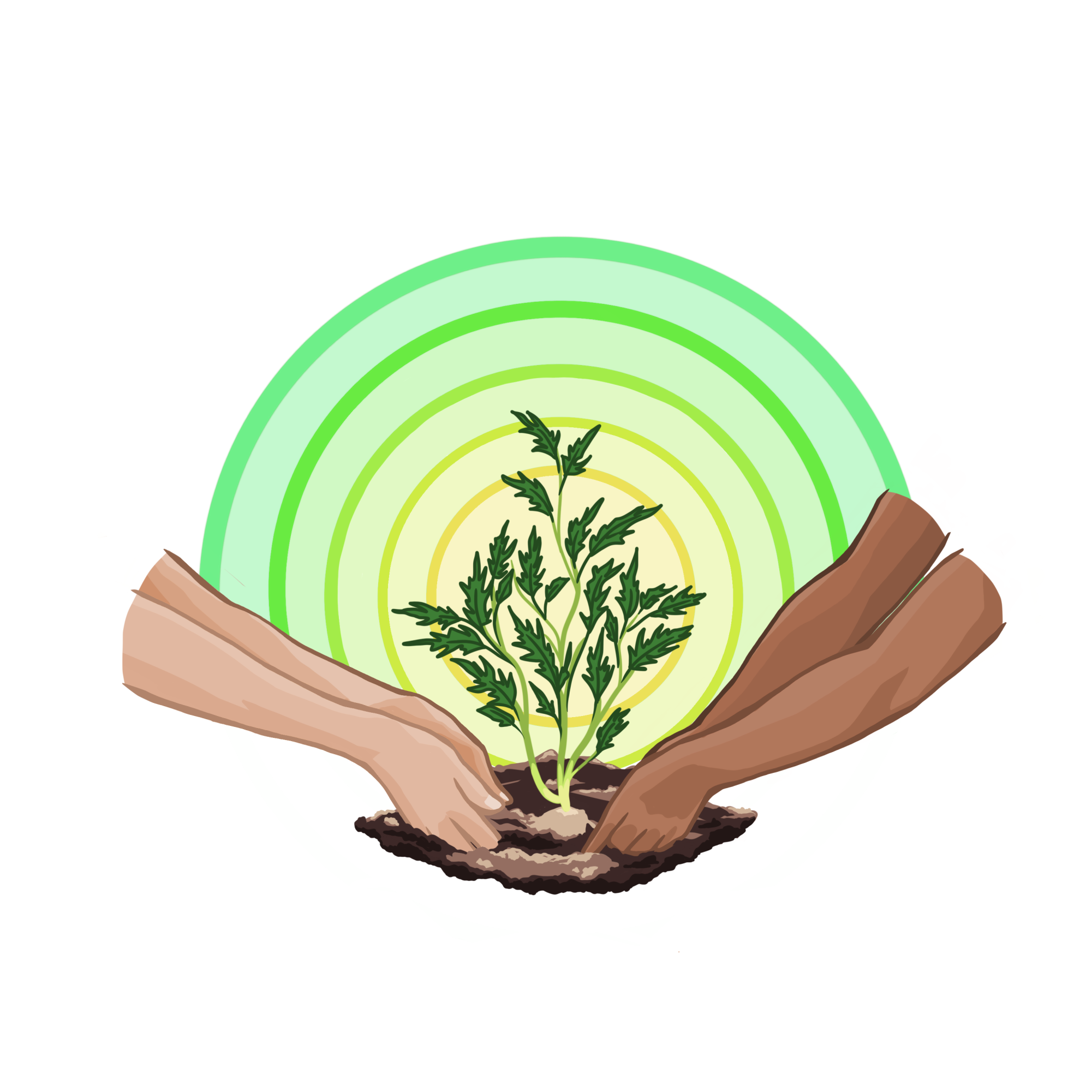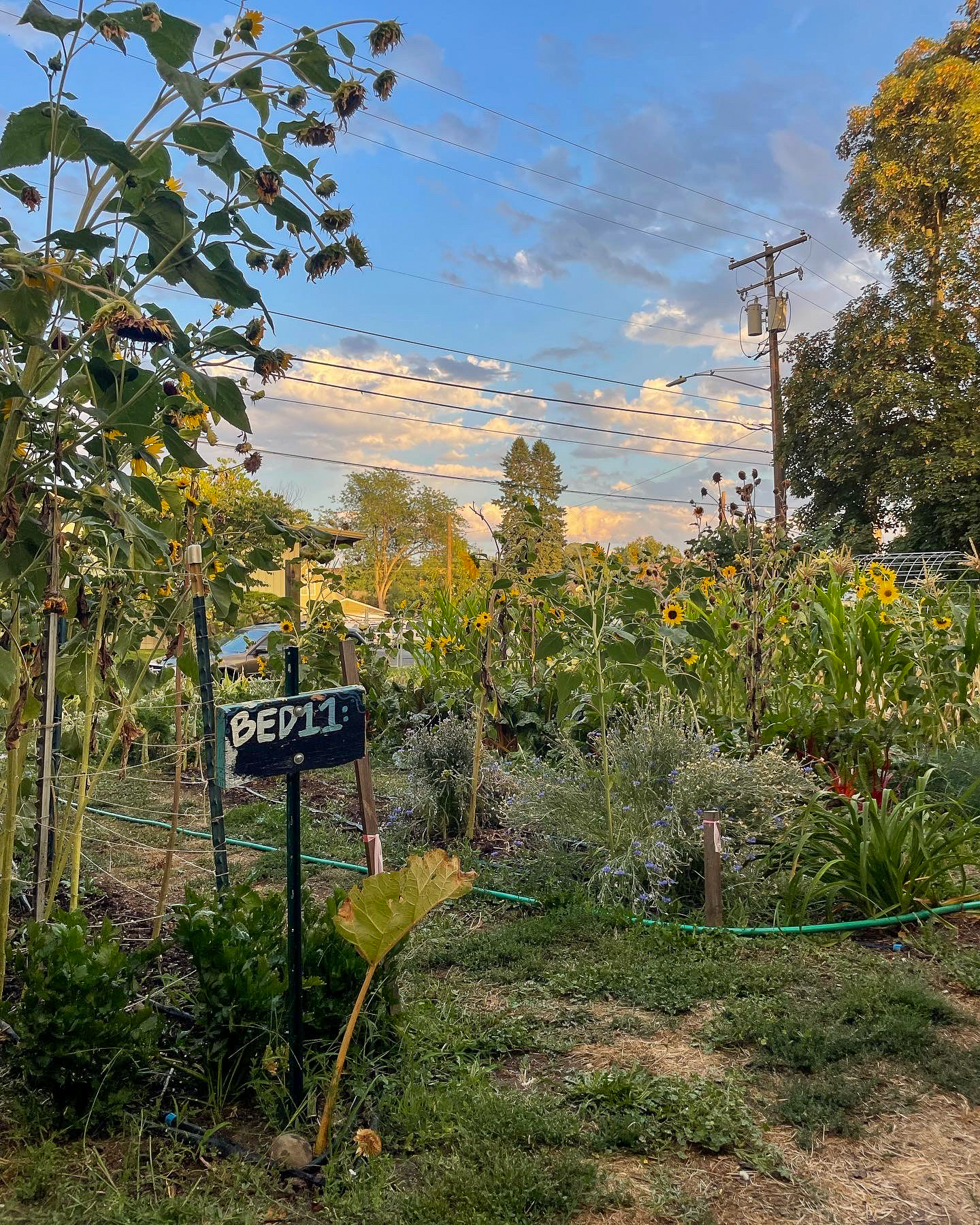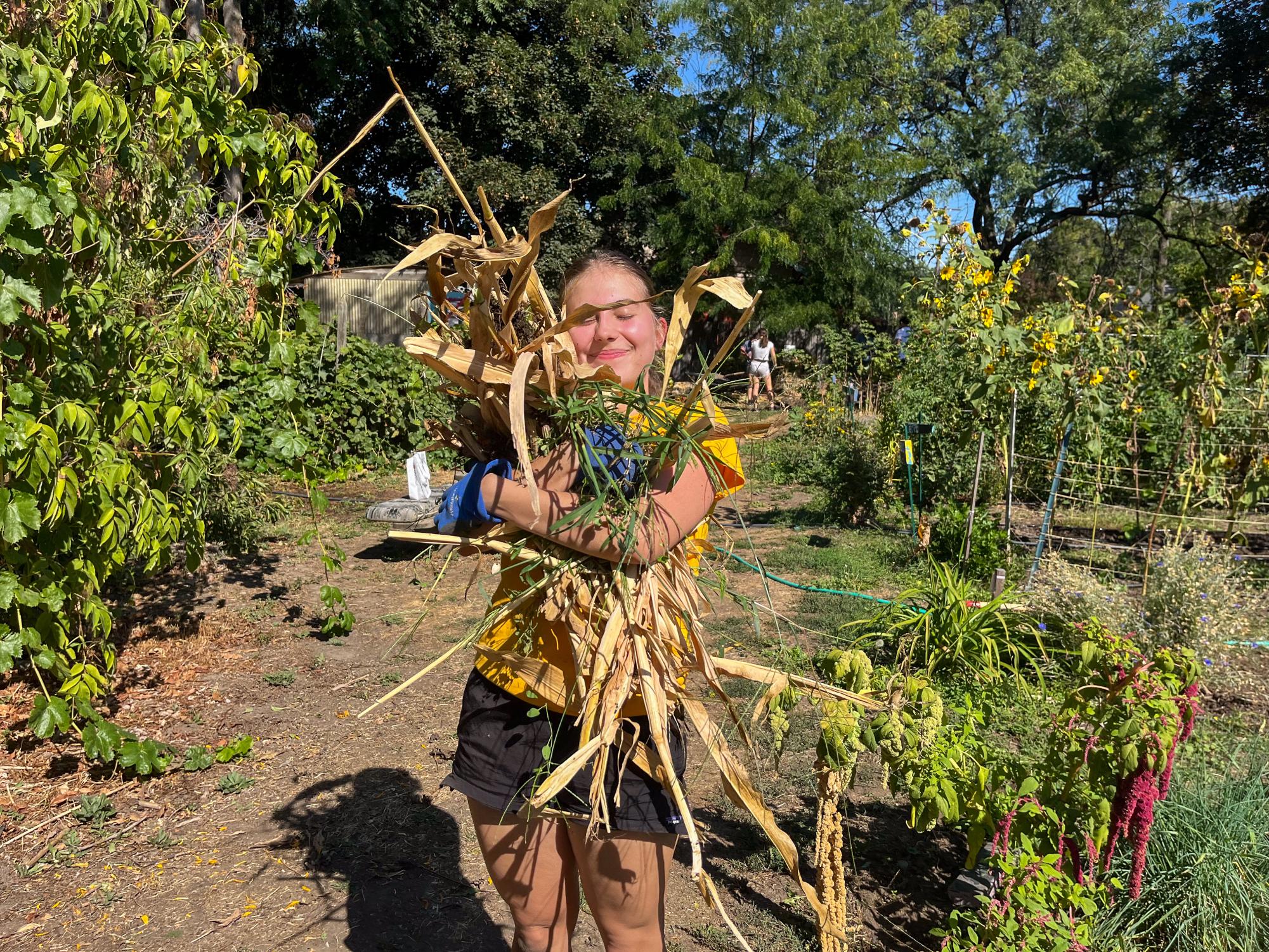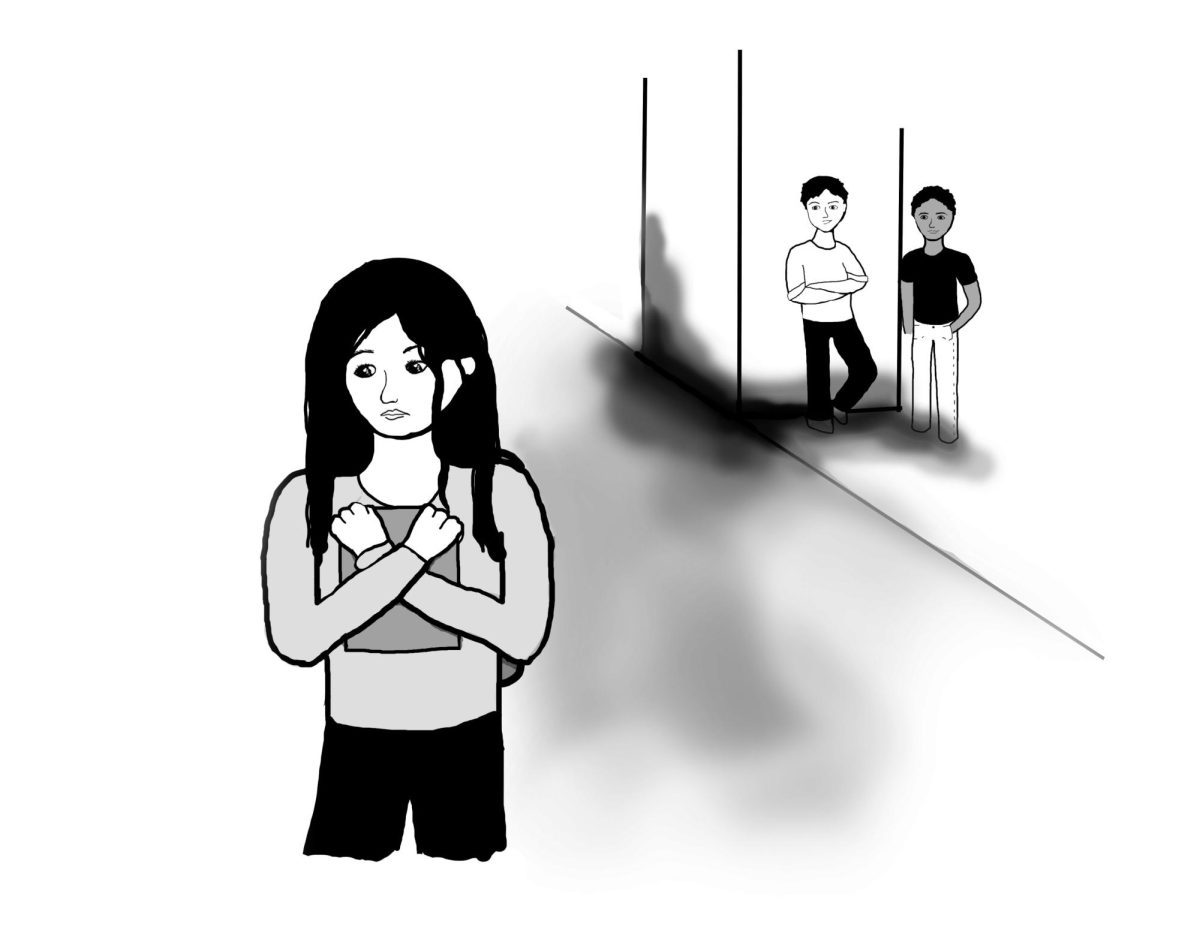
In an age of industrialized and globalized agriculture, many of us have grown up disconnected from the production of our food, despite its critical importance in our day-to-day lives. We buy strawberries in January and asparagus in October, disregarding seasonality like the half-dead pen floating in our backpacks. It’s there, but we don’t really see it amidst the countless other things that clutter our vision and demand our attention. In the grocery store: year-round access to peaches and tomatoes and broccoli and chard. In our backpacks: homework and a computer and new pens and textbooks and snacks.
While the efficiency with which grocery stores provide food has become a common and expected part of modern life, we lose something in the process. We lose our connection to our food and the process of growing. But what happens when we start to return to our roots and reconnect ourselves with our food?
For starters, reconnecting ourselves with food production, whether it be through gardening or farming, makes sense financially.
Garden Education Manager Nathan Brannon is passionate about gardening’s ability to provide food and increased financial stability. Growing up in a food desert and seeing the long-term health impact these environments can have, Brannon strives to aid communities in a similar position. One way to do this is through gardening.
“[Gardening is] a mechanism to help you financially … help you empowerment-wise because you’re taking over a lot of your life, especially your financial life, and then to understand that by doing this stuff, you’re not only providing for your family and eating healthy, but it gives you an avenue to even enter the economic market, even if that’s your local market,” Brannon said.
Food is something that we all need to survive and something we need to pay for. Tending to a garden can produce cheaper, healthier and higher quality food, therefore cutting costs on essential items. Plus, it gives the gardener increased autonomy and ability to further participate in the economic scene.
Junior Charlotte Wilken worked at a community school garden over the summer and voiced an appreciation for the material benefits of gardens.
“They produce a lot of produce that the cafeterias use there, and … a lot of produce that they give out to the community and students for free. So it’s a big resource there,” Wilken said.
Wilken was able to take home produce for herself and lamented the decrease in quality now that she no longer works at the garden and has to buy produce at the store. While we might not realize it when the grocery store is all that we know, the industrial-grown produce found in the aisles is often less flavorful and less nutritious. Gardening can provide easy access to produce that puts that of the grocery to shame.
The financial and material benefits of gardening are important, but there are other benefits as well. Taking a part in the production of our food gives us a greater appreciation for our food, whether in grocery stores or on the vine.
Sophomore Gwen Marbet grew up gardening and has continued to pursue this kind of work at the Organic Garden and Hayshaker Farm. Gardening and farm work have shaped who she is today. She urges others to consider picking up gardening as well. It can give us new hobbies and new perspectives on everyday life.
“If you have the opportunity to get involved in those things and really understand how much work and how much effort goes into you buying carrots from the store … I think that’s just so valuable,” Marbet said.
Garden Education Manager Dani Dolphin also finds that her ties to gardening have given her a new and valuable way of seeing the world. Her work at the Sustainable Living Center’s Farm to School program immerses her in gardens, deepening her connection to outdoor spaces.
“Through working in gardens and working on farms with kids, I realized just how important the land is and how important it is to be outside and be connected to that, and I have so much respect for the land. That just brings me so much joy on a day-to-day basis to be outside,” Dolphin said.
Dolphin finds a deep sense of gratitude through her work in gardens and tries to instill this in the kids as well. During Farm to School programs, they write down gratitudes and find joy in each day. This becomes a self-reinforcing cycle; recognizing and honoring our gratitude opens our eyes to more things for which we can be grateful.
Gardens inspire a sense of play as well, a feeling Dolphin experiences in her work.
“We can just enjoy the outside and touch the plants and be in the mud and use our pants as napkins,” Dolphin said. Interacting with our food as it grows allows us to immerse ourselves in the environment that nourishes us.
Gardens do more than just inspire us individually. They also draw in and strengthen communities.
When asked about how gardens impact communities, Marbet said, “I think just working alongside people and getting their hands in the dirt and really cultivating life. You cultivate plant life, but I feel like you also cultivate life between you and other people.”

Communities come together to tend to gardens and in doing so strengthen the ties between people. These connections can arise in the conversations that float above warm soil as gardeners weed together, in the shared joy of locating the first tomato on the vine, or countless other interactions and discoveries that occur amidst the greenery.
Community values don’t just stop at the small group of people actively involved in working on a garden. These values can extend outward into the larger town, especially here in Walla Walla.
Dolphin discussed how, despite living in an agricultural society in Walla Walla, many of us feel disconnected from agriculture, or only view it in the form of the large industrial wheat farms that surround us. However, she stressed the fact that there are so many smaller farms in town as well, all of them cultivating a multitude of crops.
Community gardens, like those in which Dolphin works, can help reconnect us to the larger agricultural activity around us.
“Having the gardens at these schools is a catalyst to then teach about local farms, teach about migrant farmers that are working here, teach about where our food comes from. And then be able to complete that cycle by supporting our farmers monetarily through the schools and having the kids have fresh really good produce in their schools but also creating this cycle where we’re also supporting our farmers monetarily,” Dolphin said.
Marbet echoed the importance of reconnecting with agriculture, speaking on the ways in which agriculture is typically seen as inherently negative at Whitman despite its importance in our lives.
“Wendell Berry talks about how just by eating food, you are completely immersed in the process and you are part of agriculture. And everybody has to be to eat food, to live,” Marbet said.
Understanding the links between ourselves and agriculture creates a more cohesive picture of reality and can aid both parties in appreciating the cycle between food production and distribution.
Gardens have a lot to offer, but for many of us, they can feel intimidating. I’ve had notoriously bad luck with my own plants, which has always made me wary of gardening despite my interest in getting started. I am not unique in this feeling, as I learned in my interviews.
“I think a lot of people don’t try to grow stuff because they don’t want to wake up in the morning and see their plants dead. But I always tell people … the only reason I’m able to grow plants well is because I’ve killed so many,” Brannon said.
Dolphin agreed. “Gardening is all about messing up because you can just play with different things, and if something doesn’t grow or something is eaten by pests, that’s just knowledge that you can take and learn more,” she said.
It may be a cliche, but learning from our mistakes is the foundation of honing gardening skills. Marbet also points to the importance of listening to those with previous experience.
“There’s no algorithm or a set of steps that you follow to have everything work. Everything is dependent on maybe just even just the rain, or sometimes just the soil or just the amount of time you have to give to those plants. And I think listening to people who have done that type of thing for a long time is one of the most valuable things you could do in life and also just in farming and gardening in general,” Marbet said.

In Walla Walla, we are lucky in the fact that a wealth of knowledge about farming and gardening surrounds us. There are so many ways to learn, whether it be volunteering with the Sustainable Living Center, attending Organic Garden or Glean Team events or looking for internships and jobs in one of the many farms in the area.
There is so much value to be found in taking an active role in the production of our own food and of our own community. It can seem intimidating, but as soon as you get your hands in the dirt and have the first bite of the sweet peas that you grew, you can begin to develop a deeper gratitude for the land, for food, for the people around you and for your own role in the environment.
In doing so, gardening and farming can create new ways of being.
“You can be a business leader, you can be a community leader, you can be a political activist with all of this stuff. It’s just doing it,” Brannon said.
Working in the dirt amongst plants and produce can expand our world in a multitude of ways. It can change our perspectives and our relationships with the land, grocery stores and agriculture. It can provide us with avenues for increased financial independence and community involvement, as well as a bounty of fresh fruits and vegetables.
It’s never too late to explore a new hobby and involve yourself in the outdoors and systems of food production. Whether you start by growing a single basil plant in an old yogurt container or jump straight into volunteering at a community garden, there are avenues for everyone to get involved and reclaim a connection with food production.







